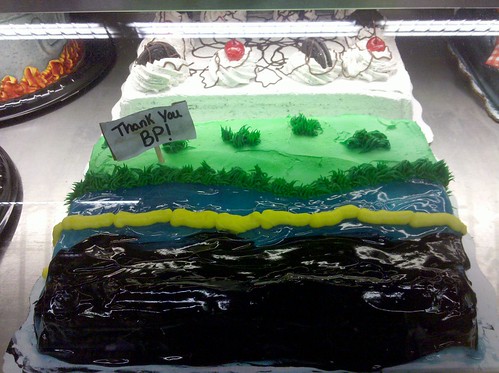
Cake spotted in Breaux Mart grocery store on Magazine Street May 18, 2010
WWLTV: Local leaders concerned after oil sheen begins hitting Pass a Loutre
PLAQUEMINES, La. -- 20 miles down the Mississippi River from Venice at the mouth of South Pass where it meets the Gulf of Mexico, large patches of oil stain the beach. Bright, slimy stains cover nearby rocks where thousand of birds normally perch.
It is the arrival of the heavy oil at the coast that officials have dreaded.
Times-Picayune: Even underwater oil must be removed, La. officials warn
Louisiana Department of Wildlife & Fisheries Secretary Robert Barham said Tuesday that an argument between EPA and NOAA over the validity of tests of the effects of dispersants in deep water call into question assurances by EPA and BP that the dispersants are safe. Barham said NOAA officials told him the ship's dispersant tests contained few useful samples and that the analysis would provide little useful information. EPA officials disputed NOAA's conclusions, he said.
"The use of sub-sea dispersants to combat the effects of the Gulf of Mexico Oil Spill on our coast is an action that I am not able to give my support to," Barham said in a letter to David Rainey, BP America vice president for Gulf of Mexico exploration, requesting more sampling information. "While I understand the importance of mitigating the effects of this oil on our fragile wetlands to date, little or no substantive data has been provided to the state of Louisiana concerning the efficacy and risks associated with deep injection of dispersants."
The Atlantic: Why BP Won't Measure the Oil Spill
One potential motivator for the company's behavior may involve its unprecedented use of chemical dispersants. Responders have been spraying the dispersants across the oil slick and applying them underwater as well. The discrepancy between the volume measurements based on the surface slick and those gleaned from the underwater footage may mean that the dispersants are working, breaking the oil into distinct particles before it reaches the surface in slick form.
Funny thing about that. Now that BP is sucking some portion of the flow up through a crazy straw hooked to a boat, they're quite happy to claim they're getting 40 percent of it. Although that figure depends on which estimate of the flow rate you believe. From the above-linked T-P article:
Some scientists have said they believe the estimate is absurdly low, and several members of Congress continued to question it Tuesday, based on new videos released by BP on Tuesday. "This new leak video deserves a new look by independent scientists," said Rep. Edward Markey, D-Mass., who chairs the House Subcommittee on Energy and Environment. "BP brags about collecting more than a 1,000 barrels of oil a day from their new siphon technique, but they still don't know how many thousands of barrels they are missing."
Here's a nice rant from Black Gulf including a timeline of the misinformation regarding the severity of the leak. It concludes
This list is far too short.Funny thing about that, of course, is the newly released video shows us..
Yet, here is major media this morning, controlled by Big Energy and Big War, ready to gobble the magic pipe (story) and we can all rest easy. The bronze statue to CNN for this prize would be pornographic and distasteful. Too distasteful for description here. I leave it to your imagination, dear reader, to conjure the image I am thinking of.
Nice.
Meantime, won't we at least ask someone for video footage of the allegedly staunched flow before we gargle and spit this information onto the public?
A new video has emerged revealing heavy plumes of oil slowly seeping out from the ocean floor in the Gulf of Mexico, suggesting BP oil leak bigger than previously thought. This is a leak that is suspiciously close to the location of BP’s Deepwater Horizon oil rig, which exploded on April 20. The plumes may be evidence of a spill that is far larger in scale than previously thought, and is certainly cause for much concern.
Last night I was half listening to WWLTV's newscast when I swear I heard somebody say in passing that the Coast Guard has had access to underwater footage of the leak for some time now but had not released it to the public until BP was ready. That seemed a little weird to me. But not quite as disturbing as this.
When CBS tried to film a beach with heavy oil on the shore in South Pass, Louisiana, a boat of BP contractors, and two Coast Guard officers, told them to turn around, or be arrested.
"This is BP's rules, it's not ours," someone aboard the boat said. Coast Guard officials told CBS that they're looking into it.
As the Coast Guard is a branch of the Armed Forces, it brings into question how closely the government and BP are working together to keep details of the disaster in the dark.
This WWL story from the same broadcast wonders if the Federal response to the leak "feels like deja vu" with regard to the flood of 2005. Yeah a little. Although I guess BP would tell you they're pretty satisfied with the service they've gotten to this point.
No comments:
Post a Comment